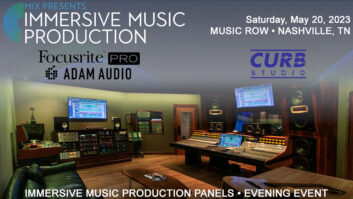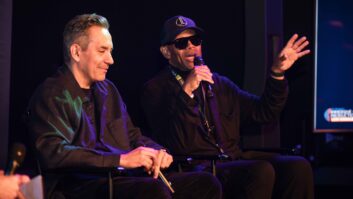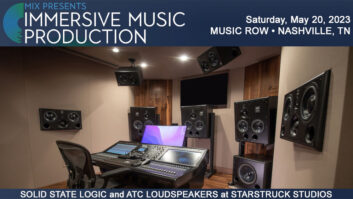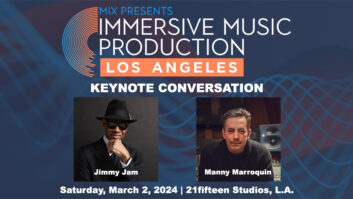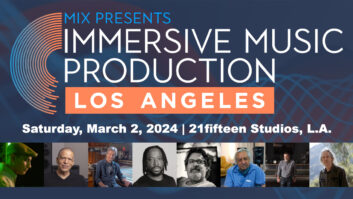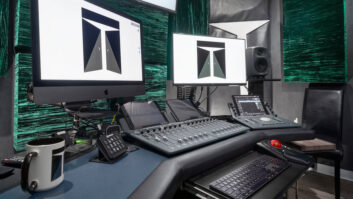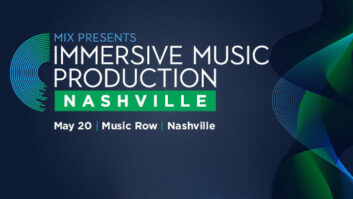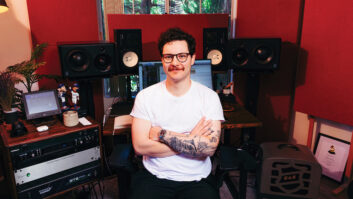WEST NASHVILLE, TN—Since 2006, Jonell Polansky has owned and operated DaCapo Music Studios. The California transplant’s bustling, west-Nashville music production facility is balanced on her experience as a musician and her background as both an EE and an audio engineer.
After years of working as a recording engineer and honing her craft in California, Polansky was lured to Nashville, where she bought property on Music Row, later selling out to move to the west side of the city before a real estate correction around 2006. “There is this mysteriously rich musical community here in Nashville,” she offers. “Between the writer’s nights and live music everywhere, the access to talent is so straightforward. It was much easier for me to find talent here, particularly in singer/songwriters.”
Jonell Polansky at the vintage Trident 80B analog console in DaCapo’s “open” control room. Understanding artists and songwriters, explains Polansky, informed her approach to building-out studios in town. Polansky has always been an adamant champion of open studio designs with no proper “glassed-in” control rooms. Specializing in recording vocalists, Polansky’s DaCapo Studios was conceptualized to make it a comfortable, soothing place to work as an artist.

“I don’t like control rooms because I don’t like the idea of talkback,” she explains. “Especially when I’m working with a singer, they stand two-to-10 feet away from me when we record vocals. Because of that, our communication is so much better and the singers love it.”
Polansky’s 1,100 square-foot DaCapo Studios is “a true hybrid studio,” she notes, as her goal was to provide the best balance of analog and digital technology for recording in the most artist-centric way possible. She explains, “For example, I use [more than an average amount of] analog outboard gear, always having been a huge fan of the Eventide UltraHarmonizer series; I always have that reverb on a headphone mix. It’s a subtle difference that often has us leaning toward Eventide reverbs.”
When artists are truly part of the decision-making process in the studio, results are better and sessions run more smoothly and faster, Polansky notes. “It’s a huge deal to me to make vocal recording natural, working in a flow where we don’t comp vocals—we just cut them on the fly. It’s all due to the client knowing how the studio works, because I explain it to them. So many producers and engineers don’t talk to their artists about how it all works. I totally involve them in the process and they love it. They get involved and the amount of time saved is staggering because of it.”
Gear-wise, Polansky name-checks her favorite preamp and vocal microphone—Avalon and the Manley Cardioid LDC, respectively— as examples of her approach to audio production. “I’ve tried out all the great mics, but I really prefer a flat frequency response; that way I can EQ the voice, not the frequency response of the microphone. The Manley has a very transparent response and just a little sizzle on the top end. Some of the ‘great mics’ will favor certain frequency bands, and the artists will love it. But for me, I don’t feel like I have the same amount of freedom to hear what the artist sounds like when using something more colored.”
When building-out DaCapo Studios, Polansky worked alongside designer Scott Munsell, who encouraged her to investigate vintage analog consoles as the centerpiece. “Oddly enough, I’d never used a Trident,” she recalls with a laugh. “He loved Neve, Soundcraft, MCI, etcetera, but the Trident was actually the most reasonable price point, and a lot easier and less expensive to maintain. The 80B is one of the most sought-after pieces in Nashville, too. Scott set me up with Warren Rhoades, who found the console for me. It hit the number of channels I wanted, the size, and its maintenance has been surprisingly trouble-free.”
DaCapo Studios
dacapomusic.com
